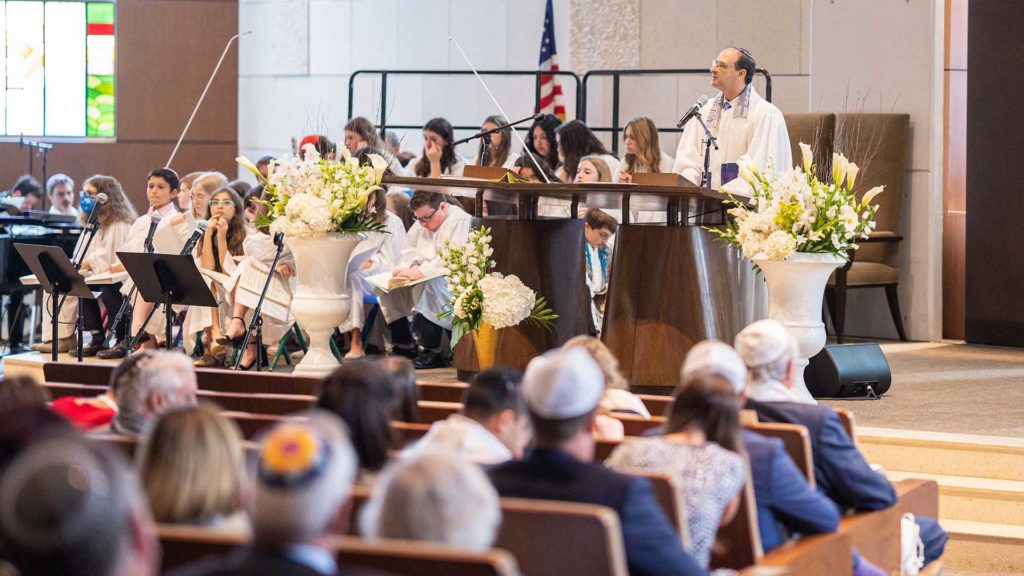Life’s Traditions
Just as the year is punctuated with designated holy days, fasts, and feasts, so within Judaism our lives also contain special religious events and rituals to mark both happy and sad times. From birth to death, we find our religion replete with special occasions that bring the family and community together.
We are here to guide you in selecting a Hebrew name for you and your children, teach you about Jewish naming customs and provide an A–Z dictionary of Hebrew names for your perusal.
In Judaism, a baby’s circumcision is much more than surgery. A Jewish baby’s circumcision marks his entrance into the covenant (brit) with God. We will help you shape this beautiful and meaningful ceremony to fit your family and put you in contact with wonderful experienced mohelim (moyals) who are not only certified, but M.D.s as well.
Our clergy have created beautiful ceremonies to welcome our daughters into the Jewish community. This symbolic ritual can take place as part of a Shabbat worship service or as a separate celebration.
According to traditional Judaism, every first-born child who is male belongs to God, and his parents should “redeem” him by making a symbolic payment? Pidyon HaBen (Redemption of the Son) is the ritual in which Jewish parents redeem their first-born son. While not particularly popular amongst progressive Jews, some parents find it meaningful to celebrate their child’s first 30 days of life by having this ceremony and giving the “ransom” to tzedakah (charity).
Bar/Bat Mitzvah literally translates to “son/daughter of the commandment” and implies that a child has matured to the age where he/she is now a responsible and obligated part of the Jewish community. We are happy to celebrate with you and your child on this day by offering B’nai Mitzvah training, tutoring and education for children and adults.
If you have any questions, please contact Phylicia Cook (B’nai Mitzvah Coordinator) 786.364.9432 pcook@tbam.org
The Torah teaches that, “A person who does not marry is not a complete person.” (Leviticus 34a) Finding your soulmate is a beautiful and rare occurrence. We are here to work with you to create a ceremony that is true to whom you are as a couple and to the Jewish tradition. From premarital counseling to the usage of the Temple as your venue, we are here to welcome you, teach you, coach you and celebrate with you at this joyous time.
If you have any questions, please contact Phylicia Cook (B’nai Mitzvah Coordinator) 786.364.9432 pcook@tbam.org
A Jewish home is traditionally marked by a mezuzah (parchment scroll containing Torah verses) on each door, outer and inner, that is not a door to a bathroom. These scrolls must be hung in their ceremonial cases within 30 days of moving into a house, and frequently a party is held in order to accomplish this ritual task. Contact us and we can bless your home, come and attach the mezuzot, or simply provide you with the proper blessing for you to say over your new home.
While Judaism does not look favorably on divorce, is has always accepted divorce as a fact of life. “When a man takes a wife and marries her, if then she finds no favor in his eyes because he has found some indecency in her, he writes her a certificate of divorce and puts it in her hand and sends her out of his house, and she departs out of his house.” ( Deuteronomy 24:1) Judaism generally maintains that it is better for a couple to divorce than to remain together in a state of constant bitterness and strife. Should you find that you are no longer in a healthy relationship, we can provide a religious divorce (get) ceremony for you and your former spouse. A civil divorce is not sufficient to dissolve a Jewish marriage in traditional Judaism.
Interested in learning more about Judaism? We are here to guide you on your Jewish journey. We offer classes that will give you an introduction to Jewish thought and practice in both Spanish and English as well as a website which will allow you to experience a year of living Jewishly. One of our rabbis will mentor you through the process. This process typically takes a year and involves study, worship, celebrating each holiday, and trying on traditions. We do not require that you keep kosher or wear ritual garb for conversion, but encourage you to try things and see what you find meaningful. Should you find that Judaism is your spiritual home and you have had significant study, the process will culminate with you sharing your story with the Bet Din (three clergy members), a trip to the mikvah (ritual bath), and a short welcoming ceremony which can be private or part of our Shabbat worship experience.
Funerals and Mourning
Death is natural and inevitable, not a curse, according to Judaism. For those in mourning over the loss of a loved one, Jewish laws on death and mourning can help them to work through their pain. We are here for you for the funeral service, minyan service, counseling, the unveiling and anything else you may need during your time of need.
